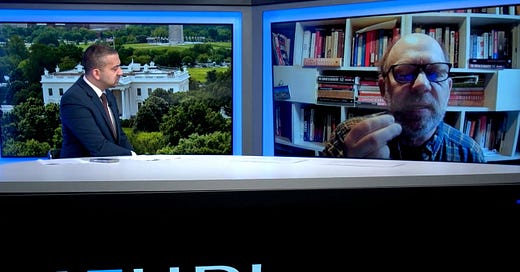How did we get from George Washington to Donald Trump?
When we think about US history, we often turn to what we learned in our textbooks: The Revolutionary War, independence from Britain, even the role the US played in both World Wars.
But this understanding of the US is incredibly Eurocentric, and leaves out a major piece of the puzzle that could help us better understand the historical moment we’re living through.
In his new best-selling book, America, América: A History of the New World, author and Yale University historian Greg Grandin highlights how Latin America has played a critical role in shaping the United States as we know it. And amid the rise of fascism, he argues that Latin America provides valuable lessons on how social democracy can combat right-wing authoritarianism.
He tells Mehdi, “One of the main ideas is that Latin America is the origins of what we call social rights… whereas the United States is the last bastion of individual rights. No other country in the world, especially rich countries, have clinged to a notion of individual rights as fetishistically as the United States does.”
He adds, “We’re the only country in the world that doesn’t believe in social rights.”
As the Democratic Party struggles to provide a united front against Trump’s fascism, Grandin notes, “Latin American social democrats know that you don’t beat fascists by calling fascists fascist. You beat fascists by offering an alternative and a broad vision of social democracy. You promise to make the material conditions of people’s lives better in real ways.”
“If liberalism is going to be revived from its near-moribund state, the only way it’s gonna be revived is by welding it, as Latin Americans consistently do, to a robust program of unapologetic social rights,” he explains.
You can click here to buy a copy of Grandin’s book, America, América: A History of the New World. And if you’ve already read it, feel free to share your own review of it with us in the comments below!
Looking for more book recommendations? Visit the Zeteo book club for inspiration!
Watch the full interview above (special no-paywall offer) to hear Grandin’s thoughts on key figures in the Democratic Party like Bernie Sanders, Alexandria Ocasio-Cortez, and JB Pritzker.
We are removing the paywall from this interview, so please do watch it in full above. Please also consider becoming a paid subscriber to help us do more work like this, and to be able to read and watch more of our content paywall-free.






















Share this post